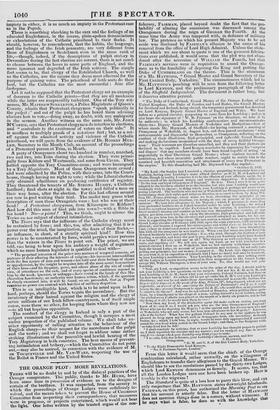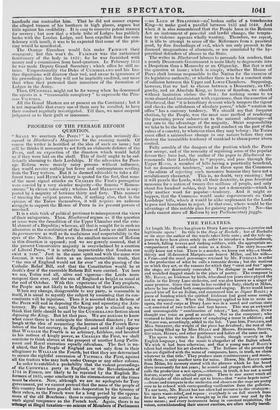THE ORANGE PLOT: MORE REVELATIONS.
THERE will be no doubt by and by of the disloyal practices of the Orange conspirators. The public, thanks to Mr. HUDIE, have been some time in possession of evidence as to the designs of certain of the brethren. It was suspected, from the secrecy in which the proceedings of Orange Lodges were sedulously in- volved, and the means taken to prevent the House of Commons Committee from inspecting their correspondence, that measures were in progress, or projects entertained, which would net bear the light. One letter written by the trusted organ of the con-
federacy, FAIRMAN, placed beyond doubt the fact that the pro- bability of altering the succession was discussed among the Orangemen during the reign of GEORGE the Fourth. At the same time the Army was tampered with, in defiance of military law. The pretence on which his present Majesty was to be set aside was disclosed by FAIRMAN S allusion to the cause of his removal from the office of Lord High Admiral. Unless the state- ment which we are about to quote is one of the grossest fabrica- tions ever published, it would seem that the plot was not aban- doned after the accession of WILLIAM the Fourth, but that FAIRMAN S services were in requisition to sound the Orange- men as to the feasibility of deposing the King and putting the Duke of CUMBERLAND on the throne. This is the statement of a Mr. HAYWOOD, " Grand Master and Grand Secretary of the First Central Body, Yorkshire." The circumstances which led to Mr. HAYWOOD'S peaching will be seen from the following letter to Lord KENYON, and the preliminary paragraph of the editor of the Sheffield Independent. The document is rather long, but it deserves attentive perusal.
" The Duke of Cumberland, Grand Master of the Orange Lodges of the
United Kingdom, the Duke of Gordon and Lord Roden, the Grand Masters for Scotland and Ireland, being abroad, the temporary government has devolved on Lord Kenyon, Deputy Grand Master of England and Wales. We bare before us a printed circular, purporting to come from his Lordship ; and as it also bears the signature of W. B. Fairman ' on the direction, we take it to be authentic • in which his Lordship anathematizes and excommunicates thirty-two Deputy Grand Masters of Yorkshire and Derbyshire—first of whom stands Mr. Haywood, of Sheffield—for having convened a meeting of Orangemen at Wakefield, in August last, and then passed resolutions most unwarrantable and disgraceful to themselves, as Orangemen, reflecting on the conduct of their illustrious, high.principkd, and ittflexible Grand Master, and making declarations inconsistent with the duty of every faithful Orange- man. Their warrants are therefore cancelled, and they and their abettors are declared to be expelled. Lord Kenyon concludes by expressing his surprise and disgust ' that any members should have been found capable of acting so ungratefully to their Illustrious Grand Master ; whose conduct towards the institution, and whose invariable public conduct, ought to entitle him to the unmixed and heartfelt veneration and attachment of every true Protestant in the empire.' To this thundering bull Mr. Haywood has thus replied- ., October 21, I535. " My. Lord—On Sunday last I received a circular, purporting to emanate nom your Lordship, having your Lordship's name affixed thereto, as D. O. M. of England and Wales, though in reality I conceive it to be the effusion of your officious agent, for it savours much of his malignant temper and traitorous disposition. It is addressed- ' To the true and loyal Orangemen of England.' Be it so. Theo I aver it to be quite adapted to the brethren alluded to in the circular. but who your Lordship would now seemingly wish to expose; in doing which, your Lordship is perhaps not aware of ex- posing yourself. The brethren who met me at Wakefield are Orangemen. claiming and maintaining their civil rights and religious liberties, as secured to them by Kin Vi l. W- 1Mm III., Prince of Orange, whose name we bear, cherishing the principles or our creed as published by your direction, viz. lusting nu cue on account of his religious opinions. We bear true allegiance to his Majesty ; which, I presume, is more than your pretended brothers do, as I shall hereafter notice to your Lordship ; for when I read the sycophant language of the Ex-Colonel in the circular, it reminds me of the hind menial's mission and conduct un his late tour throughout the country. at one guinea per diem, coach hire, 8.:c.; whom the illustrious. Ingh-principled and inflexible G. M. (as you term him in the circular) and yourself eulogized so much, for his ser- vices in supporting the Orange cause. Ile was sent on a second tour, as appears by the Grand Lodge circular of February 15th 1833, upon the same expenses, wit It incidentals allowed; and because I exposed his extravagance and wilful wash. tit Aitdrie in :,cot- 1 ind, (where he distributed money and wine in the streets,) I have been thwartisl by him with all the arrogance he was master of. When ) ou last wrote me, your Lordship dictated brotherly love and good reetiog if so, why send, through the medium of your hireling, a circular, and leave the post to pay. when your Lordship might hare franked it as before? But why send one at alt? Why threaten us with cancelling our win. rants. and expelling -AS ? We tell you again, my Lord. as we toll you befiire in a printed circular I drew up at Wakefield, that we had entirely withdrawn ourselves from the Grand Lodge. on account of your exactions and tyranny, by not only com- pelling our principles, but our money, to support it. My Lord, this exposition of us. as you term it, is an exposition of yourself, and I have no doubt ill soon be found out. to your Lordship's mortification. Your Lordship, in the circular, says 'tondo.," about all the Lodges in London having tendered in their resignations to the Grand Lodge. except 206. William Thompson, a man of your own. No, this would not suit your Lordship. " Now, my Lord, as exposition seems to be the order of the day, I should wish to ask your Lordship a few questions on the subject. Did not his IL H. as G. M., aud your Lordship as D. G. ST., know sliat your missionary, Colonel Fairman, hod done on his first tour in 1832? Or rather, did he not act under his R. H.'s and your Lordship's directions ; and was he not under those directions instructed to sound the brethren how they te,uld be dispo.ed, in the event tithe King. William IV., being deposed, which was not improbable, on account of his ..anci toning the Reform of Parliament ; and if so, it would become the duty of ecery Orangeman to support his It. IL, who would then, in all probibility, be called to the throne .r And was he not echoed at Barnsley, when putting these ques- tions. by a bloodhound in the shape or a man, calling himself a loy al brother, saying. • he wished every Catholic was placed at the mouth of a thirty six pounder, and he had the firing of it off; he would blow them to—.' "Now then, my Lord, if the diminutive agent did make such an oration, yon must know of ii; and if so, I would ask you, who are the true Orangemen of England? Tissue who are for deposing his Majesty ? or the ancient and free Orangemen who met at Wakefield, who not only swear, brit bear true allegiance to his M kjesty ? Likewise, who is the traitorl What has the gallant Colonel to say now to the epithets lie was pleased to heap upon my bead, such as demagogue, base, site incendiary, firebrand. traitor, &c.; which I told him, in reply. would be more fitly appropriated if entwined round his own head when seated in the Grand Lodge; and then, as the Scripture saith, ' so take heed lest he fall.' " I shall conclude by noticing. that as your Lordship has thought proper to publish us. I shall republish the circular and my answer; and am ready at any time to answer any fo'ore charge which your Lordship may thinhproper to make. •• I remain, w ith due deference. your Lordship s obedient, ancient, and free
Orangeman, J. HAYWOOD, " Right Honotirable Lord Kenyon,
"No. 1i.ean;n.loG. S. of the first Central Body, Yorkshire. To the " No. 9, Portman Square, London."
From this letter it would seem that the chiefs of the Orange combination calculated, rather unwarily, on the willingness of Englishmen to transfer their allegiance to the Grand Master. We should like to see the resolutions passed by the thirty-two Lodges, w hich Lord KENYON denounces so fiercely. It seems, too, that all the London Lodges save one have been broken up. 111.:re is trouble in the wigwam !
The Standard is quite at a loss how to parry this blow, and can only conjecture that Mr. HAYwoon states downright falsehoods. FAIRMAN, on this point, has authorized the Morning Post to say that his account is utterly false. But the letter of HAYWOOD does not mention things done in a corner, without witnesses. If he says what is false, he does so with the knowledge that
hundreds can contradict him. That he did not sooner expose the alleged treason of his brethren in high places, argues but little against his credibility. It is easy to conceive potent reasons for secrecy ; but now that a whole tribe of Lodges has publicly broke with the London Lodge, and been expelled from the con- federacy with insult, it was to be expected that some of the plot- ting would be manifested.
The Orange Grandees would fain make FAIRMAN their scapegoat; but this won't do. FAIRMAN was the authorized functionary of the body in 1832; for he was furnished with money and a commission from head-quarters. In February 1833 be was made Deputy Grand Secretary ; which office he still re- tains. Unquestionably the Duke of CUMBERLAND and his bro- ther dignitaries will disavow their tool, and swear to ignorance of his proceedings ; but they will not be implicitly credited, any more than when they protested their innocence of the formation of Lodges in the Army. Thus, O'CONNELL might not be far wrong when be denounced the agents in a "treasonable conspiracy" to supersede the Prin- cess VICTORIA.
All the Grand Masters are at present on the Continent ; but it is not impossible that every one of them may be recalled, to have their conduct regularly investigated. Till then, we must suspend judgment as to their guilt or innocence.



























 Previous page
Previous page